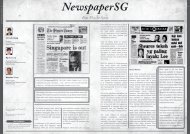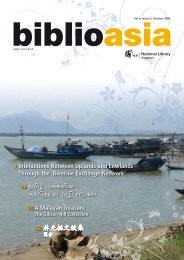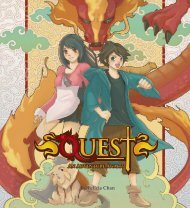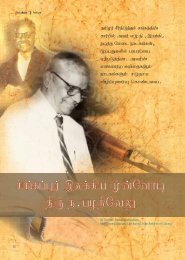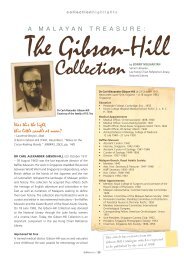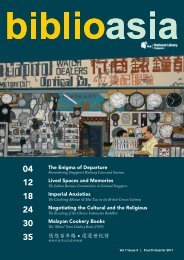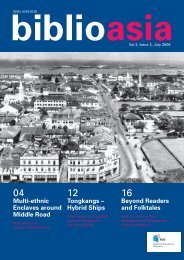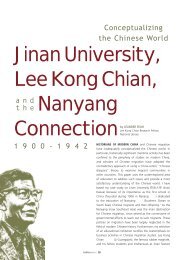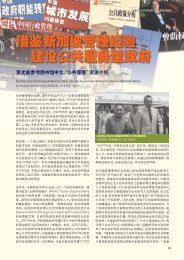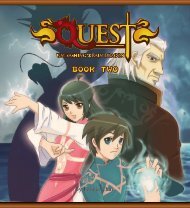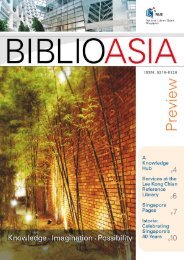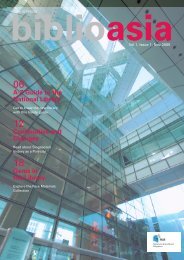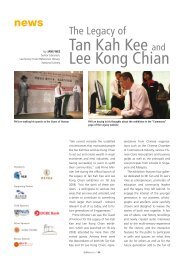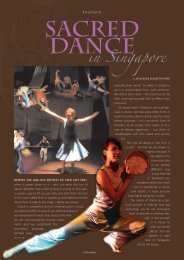Knowledge Economy: Linchpin of ASEAN Integration A View from ...
Knowledge Economy: Linchpin of ASEAN Integration A View from ...
Knowledge Economy: Linchpin of ASEAN Integration A View from ...
Create successful ePaper yourself
Turn your PDF publications into a flip-book with our unique Google optimized e-Paper software.
director’s columnContentsDirector’s ColumnFeatures04<strong>Knowledge</strong> Sharing in Singapore’s Post-secondary Educational Institutions10Selected British Colonial Era Overseas Chinese Personalities and Their Links toCommunities and Establishments in Singapore, Penang and Yangon18Women and Islam in Pre-Nineteenth Century Aceh24Social Innovation in Singapore: Two Case studies <strong>of</strong> Non-governmentalOrganisations28Building the Mosaic: In Search <strong>of</strong> Southeast Asian Contemporary Art Writingand Publishing34<strong>Knowledge</strong> <strong>Economy</strong>: <strong>Linchpin</strong> <strong>of</strong> <strong>ASEAN</strong> <strong>Integration</strong>Collection Highlights36Singapore Town Club Collection38A <strong>View</strong> <strong>from</strong> the Top: Williams-Hunt Aerial Photograph CollectionEditorSub-editorscontributorsdesigner and printproductionAngelina PhoonJoseph Maria DawesKathryn Marian LaneSuporn ArriwongChiam Ching LeenDaw WinEunice LowMa. Theresa R. MilallosMakeswary PeriasamyRoberta BalagopalSundari BalasubramaniamSurin PitsuwanVicky GaoZhang LiyanViscion Media GroupCover: Items <strong>from</strong> the Singapore Town Club CollectionAll rights reserved, National Library Board Singapore 2009Printed in April 2009ISSN: 0219-8126All rights reserved. No part <strong>of</strong> this publication may be reproduced,stored in a retrieval system, or transmitted in any form or byany means, electronic, mechanical, photocopying, recording orotherwise, without written permission <strong>of</strong> the National LibraryBoard Singapore.Whilst the National Library Board Singapore has used reasonableendeavours to ensure that the information provided in thepublication is accurate and up to date as at the time <strong>of</strong> issue, itreserves the right to make corrections and does not warrant thatit is complete.The National Library Board Singapore disclaims all liability andresponsibility for any loss caused to any person by any act oromission, due to the material contained in this publication.If you have any comments, questions or suggestions about thispublication, please direct them to:Ms Ngian Lek ChohDirectorNational LibraryIt is our pleasure to bring you a speech delivered by Dr Surin Pitsuwan,Secretary-General <strong>of</strong> <strong>ASEAN</strong>, entitled “<strong>Knowledge</strong> <strong>Economy</strong>: <strong>Linchpin</strong> <strong>of</strong><strong>ASEAN</strong> <strong>Integration</strong>”. His speech highlights the importance <strong>of</strong> libraries inbuilding a socio-cultural community in this region.Four <strong>of</strong> our Research Fellows - Ms Chiam Ching Leen, Ms Daw Win, Ms Ma.Theresa R. Milallos and Dr Zhang Liyan - have contributed their research piecesto this issue. Ms Chiam’s article, entitled “<strong>Knowledge</strong> Sharing in Singapore’sPost-secondary Educational Institutions” provides interesting insights onthe complex social negotiations that strongly influence the practice <strong>of</strong>knowledge sharing in Singapore’s educational institutions. In another article,“Social Innovation in Singapore: Two Case Studies <strong>of</strong> Non-governmentalOrganisations”, Dr Zhang examines the function <strong>of</strong> non-governmentalorganisations in Singapore by analysing the Chinese clan associations andgrassroots organisations, which play significant roles to the nation-building<strong>of</strong> the city-state.In Ms Daw Win’s article, “Selected British Colonial Era Overseas ChinesePersonalities and their Links to Communities and Establishments in Singapore,Penang and Yangon”, she chose a few Chinese entrepreneurs <strong>from</strong> the threecities during the British rule to discuss the business empires they built, thelegacies they left behind, and the lessons we could learn <strong>from</strong> them. In thearticle, “Women and Islam in Pre-nineteenth Century Aceh”, Ms Ma. TheresaR. Milallos examined how Islam played a part in influencing gender relationsin Aceh during the pre-19th century and highlighted that women in SoutheastAsia and Aceh did enjoy more economic power and personal freedom beforecolonisation than their counterpart in the West, East and South Asia.If you are interested to apply for the Lee Kong Chian Research Fellowship,the brochure and application forms are available for download at HYPERLINK“http://www.nl.sg” http://www.nl.sg (click on “Site Map”, followed by “LeeKong Chian Research Fellowship”).In this issue, we are also happy to present to you articles written by ourReference Librarians. In Ms Roberta Balagopal’s article entitled “Buildingthe Mosaic: In Search <strong>of</strong> Southeast Asian Contemporary Art Writing andPublications”, she discusses the sources <strong>of</strong> Southeast Asian contemporary artwriting and publications, its audience, and provides possible ideas on how itcan be sustained. In our collection highlights, Ms Makeswary Periasamy bringsus the Williams-Hunt Aerial Photograph Collection. This contains photographstaken mostly during and after World War II, while Ms Eunice Low contributes apiece on the collection <strong>of</strong> the Singapore Town Club, founded in 1862.We hope you will enjoy reading this issue and we welcome your valuablecomments and feedback.Want to know more about what’s going on at the National Library? Get the latest on ourprogrammes at our blog at http://dl.nlb.gov.sg/victoriaNational Library Singapore100 Victoria Street#07-02 National Library BuildingSingapore 188064TEL: +65 6333 7977FAX: +65 6333 7990EMAIL: cis@nlb.gov .sgwww.nlb.gov.sg2



